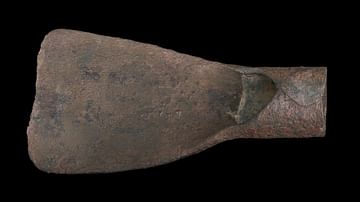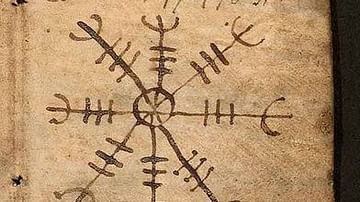Search
Did you mean: Trajan?
Search Results

Article
The Song of the Hoe
The Song of the Hoe is a Sumerian praise poem celebrating the hoe for its many uses and linking it to the creation of the world by the great god Enlil. As the economy of Mesopotamia was almost entirely based on agriculture, it is not surprising...

Interview
Game Interview: Old World by Mohawk Games
In this article, we interview the creators of Old World, the new upcoming game by Mohawk Games. We are here with Leyla Johnson, the head writer of the game and CEO, and Soren Johnson, who is the creative director. Jan (Ancient History Encyclopedia...

Image
Viking Whalebone Plaque
Viking Whalebone Plaque, in the shape of two dragons facing each other with details added on one side of the plaque. It is also decorated with dotted circles and geometric designs. Found in a boat burial. The function of these whalebone plaques...

Image
The Helm of Awe
The Helm of Awe (Icelandic: Ægishjálmur), a magical symbol (stave) recorded in an Icelandic manuscript in the 1600s. The term is attested in the Old Norse poem Fáfnismál (1200s) in the context of the fight between the hero Sigurd and the...

Video
The Shogunate: History of Japan
A brief history of the Shogunate system of Japan.
"Eastminster"
Kevin MacLeod (incompetech.com)
Licensed under Creative Commons: By Attribution 3.0
http://creativecommons.org/licenses/by/3.0/

Definition
Religion in the Ancient World
Religion (from the Latin Religio, meaning 'restraint,' or Relegere, according to Cicero, meaning 'to repeat, to read again,' or, most likely, Religionem, 'to show respect for what is sacred') is an organized system of beliefs and practices...

Definition
European Colonization of the Americas
The European colonization of the Americas was the process by which European settlers populated the regions of North, Central, South America, and the islands of the Caribbean. It is also recognized as the direct cause for the cultures of the...

Definition
Norse Mythology
Norse mythology refers to the Scandinavian mythological framework that was upheld during and around the time of the Viking Age (c. 790- c. 1100 CE). Complete with a creation myth that has the first gods slaying a giant and turning his body...

Definition
Ancient Egyptian Mythology
Egyptian mythology was the belief structure and underlying form of ancient Egyptian culture from at least c. 4000 BCE (as evidenced by burial practices and tomb paintings) to 30 BCE with the death of Cleopatra VII, the last ruler of the Ptolemaic...

Definition
Genghis Khan
Genghis Khan (aka Chinggis Khan) was the founder of the Mongol Empire which he ruled from 1206 until his death in 1227. Born Temujin, he acquired the title of Genghis Khan, likely meaning 'universal ruler’, after unifying the Mongol tribes...